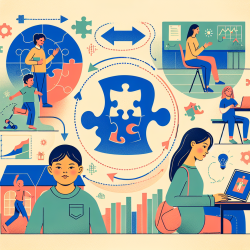As a speech-language pathologist deeply committed to data-driven decisions and improving outcomes for children, it's crucial to stay informed about the latest research. A recent systematic review titled A Systematic Review of Household and Family Alcohol Use and Childhood Neurodevelopmental Outcomes in Low- and Middle-Income Countries offers valuable insights into how family alcohol use impacts child development in low- and middle-income countries (LMICs).
The review analyzed 28 studies involving 42,599 children from 11 LMICs, focusing on the effects of household alcohol misuse on neurodevelopmental outcomes. The most common outcomes observed were behavioral problems, cognitive delays, and risky behaviors. Here are some key takeaways that can help practitioners like us enhance our approach:
Behavioral Problems
- Out of 19 studies, 10 showed a significant correlation between household alcohol exposure and increased behavioral issues in children.
- Validated tools like the Strengths and Difficulties Questionnaire (SDQ) and Child Behavior Checklist (CBCL) were frequently used to assess these problems.
Cognitive Delays
- Eight studies indicated that children exposed to household alcohol misuse had lower academic performance and IQ scores.
- In particular, paternal drinking showed a dose-dependent relationship with lower cognitive scores.
Risky Behaviors
- Six studies examined risky behaviors such as substance abuse and self-harm, primarily in older children and adolescents.
- Higher rates of suicide attempts were observed in families with alcohol abuse problems.
These findings underscore the importance of addressing household alcohol misuse as part of a comprehensive approach to child development in LMICs. As practitioners, we can implement the following strategies:
1. Early Identification and Intervention
Utilize validated screening tools like the SDQ and CBCL to identify children at risk of behavioral and cognitive issues early. Early intervention can mitigate long-term adverse outcomes.
2. Family-Centered Therapy
Incorporate family counseling and support services to address the root causes of alcohol misuse and its impact on children. A holistic approach can lead to better outcomes for the entire family.
3. Advocacy and Policy Development
Advocate for policies that address alcohol misuse at the community and national levels. Collaborate with policymakers to develop programs that support affected families and children.
Further research is needed to establish causal relationships and identify effective interventions. As always, staying informed and using data to guide our practice will help us create better outcomes for the children we serve.
To read the original research paper, please follow this link: A Systematic Review of Household and Family Alcohol Use and Childhood Neurodevelopmental Outcomes in Low- and Middle-Income Countries.










